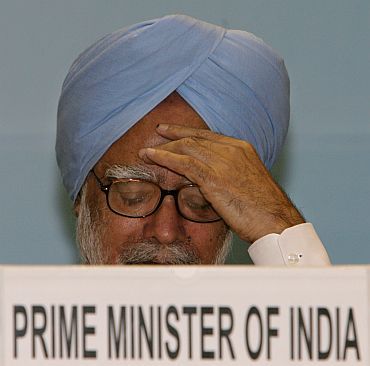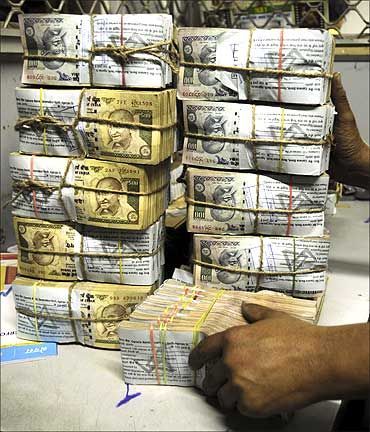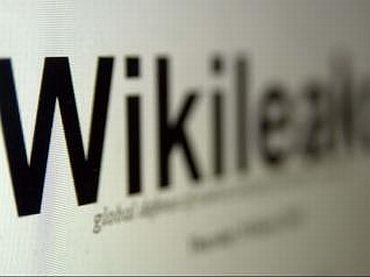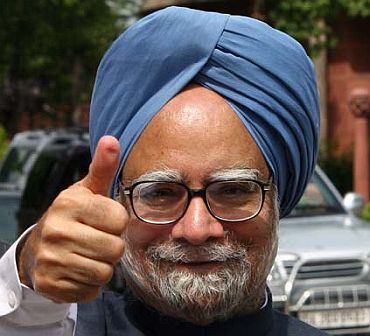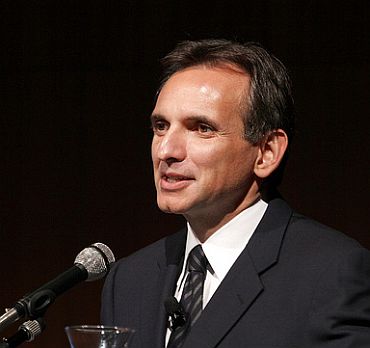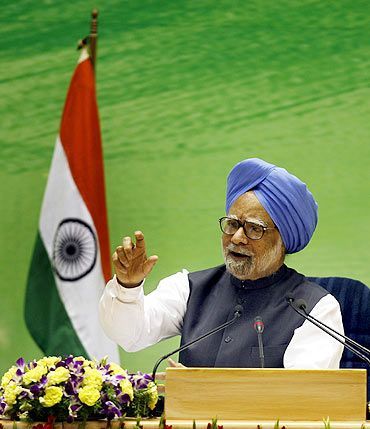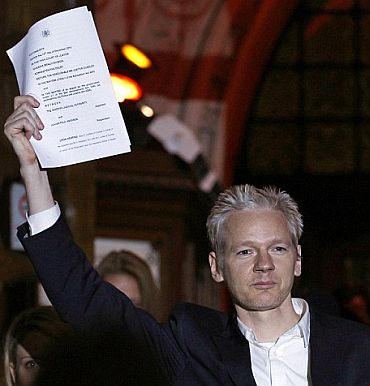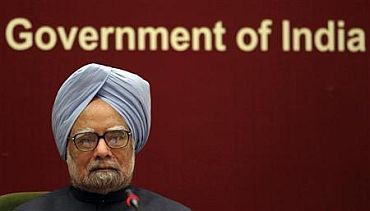 | « Back to article | Print this article |
Cash for votes: Why blindly trash WikiLeaks, Mr PM?
When governments around the world are taking serious note of the WikiLeaks diplomatic cables, Indian Prime Minister Manmohan Singh's dismissal of the same as speculative, unverified and unverifiable does very little to restore the tarnished dignity of the Indian Parliament, writes B Raman
In July 2008, there were allegations of vote-buying levelled by the Bharatiya Janata Party and other opposition parties to influence voting after a motion of no-confidence against Prime Minister Manmohan Singh's government.
The no-confidence motion was triggered off by opposition challenges to the Indo-US civil nuclear co-operation agreement. The no-confidence motion failed. The allegations were investigated by a committee constituted by the Lok Sabha, which concluded that there was insufficient evidence to come to any definitive conclusions.
On December 16, 2008, the then Speaker of the Lok Sabha Somnath Chatterjee stated as follows in the Lok Sabha: "The finding of the Committee is that material on record does not conclusively prove that the money contained in the bag which was eventually displayed in the House was actually sent by the persons who were alleged to have sent it for the purpose of winning over Shri Ashok Argal, Shri Faggan Singh Kulaste and Shri Mahavir Bagora to vote in favour of motion of confidence."
Click on NEXT to read further...
Cash for votes: Why blindly trash WikiLeaks, Mr PM?
"The committee has, however, found the evidence given before the committee by three persons involved in this episode as unconvincing and the committee has suggested that their role in the matter needs to be investigated by investigating agencies. I am accordingly referring the matter pertaining to the said three persons to the Minister of Home Affairs for appropriate action in the light of the recommendations of the committee."
In paragraph 168 of its report, the committee observed as follows: "The committee, after taking into account their findings and conclusions in the matter as detailed in para 141, particularly at 14 to 17 relating to roles of Shri Sanjeev Saxena, Shri Sohail Hindustani and Shri Sudheendra Kulkarni, recommend that this matter may be probed further by an appropriate investigating agency."
The matter was referred to the Delhi Police for investigation. Further investigation is in progress. One does not know till now the result of the investigation that has been going on for more than two years.
Cash for votes: Why blindly trash WikiLeaks, Mr PM?
The cable of the CDA does not identify by name the political counsellor. The cable also has a reference to the interactions of 'an embassy staff member' with Nachiketa Kapur, described as Sharma's political aide, on July 16. This staff member has not been identified either.
It is not clear whether the political counsellor and the embassy staff member are one and the same person. The Hindu had obtained the cable from WikiLeaks. The cable spoke ofalleged plans of the Congress to pay bribes to certain members of the Lok Sabha in an attempt to influence the voting. It also claimed that Kapur showed the Embassy staff member some boxes said to be containing the money which was to be paid as bribe.
This is a new allegation and a new piece of evidence, if true, which had not figured in the enquiry held by the Lok Sabha committee of 2008.
Cash for votes: Why blindly trash WikiLeaks, Mr PM?
The government was, therefore, under a moral and legal obligation to refer the details of the alleged contents of the cable to the Delhi Police for further investigation as part of their continuing investigation in the case arising from the Lok Sabha Committee's report.
It did not do so. Dr Singh, on his own, without even an attempt at an enquiry rejected the contents of the cable as published by The Hindu as speculative, unverified and unverifiable.
This conclusion was based not on a criminal investigation by an investigating agency, but on the partisan political assertion of the Prime Minister.
In a statement in the Lok Sabha on March 23, the Prime Minister stated as follows: "I reiterate that it is not possible for the government of India to confirm the veracity or the contents of such communications. If they exist, they would be communications from the US diplomats stationed in New Delhi to their government inWashington. This is not open to us to inquire from either of the two regarding the communications they exchanged amongst themselves. In my Statement of March 18, 2011, I had also stated that many of the persons referred to in these communications have strongly denied their veracity "
Cash for votes: Why blindly trash WikiLeaks, Mr PM?
The Prime Minister's statement of March 23 was preceded by two significant developments relating to the authenticity of the WikiLeaks cables released all over the world.
On March 19, the US State Department accepted the resignation of the US Ambassador to Mexico Carlos Pascual whose cable to the US State Department containing allegations regarding Mexico's anti-drug policy came in for strong criticism from the Mexican government.
The fact of his resignation and its acceptance by the State Department amounted to an implicit acceptance of the authenticity of this cable as leaked by WikiLeaks.
When the WikiLeaks cable containing serious allegations against the Mexican government leveled by the US Ambassador was published by the local media, the Mexican President did not dismiss it as speculative, unverified and unverifiable.
He strongly protested to the US government against the allegations against the Mexican government made by the US Ambassador in his cable. The US government had to ask its Ambassador to resign so that state-to-state relations with Mexico were not affected.
Cash for votes: Why blindly trash WikiLeaks, Mr PM?
Compare the strong reaction of the Mexican President with the weak action of our Prime Minister. He does not refer the matter to the police for an enquiry. Nor does he protest to the US government over a cable, which seeks to cast doubt on the state of Indian democracy and tarnish the dignity of the Indian Parliament.
Without referring the matter to the police and without taking up the matter with the US government, the Prime Minister on his own dismisses the whole thing as unverified and unverifiable.
The other significant development related to a detailed interview of Julian Assange of WikiLeaks by Prannoy Roy, Chairman of television news channel NDTV. The details of the interview were carried by The Hindu on March 22.
Cash for votes: Why blindly trash WikiLeaks, Mr PM?
In this interview, Assange, inter alia, stated as follows: "When we look at the cables in other contexts, they have been used and accepted as evidence in the (Charles) Taylor case in The Hague; they have been using quotes in Spain to reopen a rendition case. They have been used in a number of places; they have been accepted as quotes, as probative evidence, as genuine official documents."
"Of course, what the officials say and, how they gain their knowledge too must be investigated and interrogated. But the comment I have been hearing from Prime Minister Singh -- these, to me, seem like a deliberate attempt to mislead the public by suggesting that governments around the world do not accept the material and it is not verified "
Cash for votes: Why blindly trash WikiLeaks, Mr PM?
The government managed to wriggle out of a difficult situation in the Lok Sabha on March 23 because the BJP was more interested in securing some partisan political gains for itself than in having the truth established in order to safeguard the health of our democracy and protect the self-respect of the nation.
Neither the Congress nor the BJP was interested in establishing the truth. They were only interested in partisan political gains. It is time for the right-thinking citizens of the country, who have no political agenda, to take over the matter and pursue it doggedly till the truth is established.
The matter needs to be raised before the Supreme Court in a public interest petition.
